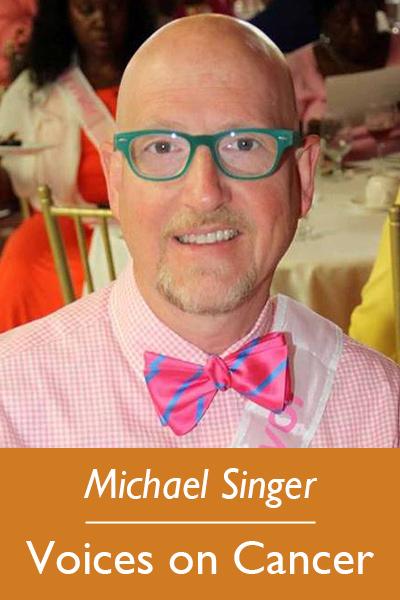
Voices on Cancer is an award-winning Cancer.Net Blog series where advocates share their stories and the lessons they have learned about being a cancer advocate. Michael Singer, a New York City native, is a male breast cancer survivor. He is a member of the Male Breast Cancer Coalition, an advocacy organization working to educate the world about male breast cancer. He wants all men to know they should routinely check themselves and be aware that early detection is a key to surviving this disease.
My advocacy story
This December, I will be a 7-year survivor of breast cancer. I was diagnosed with ductal carcinoma in situ at age 50. As a man, I never checked myself and ignored the issues I was having for several months until I went to my doctor for a routine physical exam. Within days, I had a needle biopsy followed by a surgical biopsy, and then a full mastectomy of my left breast.
When I found out I had a cyst under my left nipple, I was shocked and embarrassed. I had never heard of men getting breast cancer.  Even after my diagnosis and surgery, I called it chest cancer when people asked. There was barely any information on male breast cancer. And I couldn’t find other men with breast cancer to reach out to.
Even after my diagnosis and surgery, I called it chest cancer when people asked. There was barely any information on male breast cancer. And I couldn’t find other men with breast cancer to reach out to.
One day, I saw a television show hosted by Katie Couric that changed my life. Her guest was a young male breast cancer survivor named Bret Miller. Finally, I was able to connect with other men with breast cancer. I have since been an active member of his foundation, The Male Breast Cancer Coalition. As a part of the foundation, I help spread the word that men can get breast cancer too.
I also make myself available to other men diagnosed with breast cancer and share my firsthand knowledge about what it is like. I have had the opportunity twice to serve as a consumer reviewer to evaluate research applications submitted to the Breast Cancer Research Program sponsored by the Department of Defense. I found this experience extremely rewarding, and it made me feel like I could make a difference. It was rewarding and emotional to interact with scientists and patient advocates dedicated to improving life for those of us living with this disease.
I also discovered the National Breast Cancer Coalition’s advocacy training, Project Lead Initiative. This educational program teaches advocates about public policy and the role they can play in breast cancer research. The training also covers the basics of molecular biology, genetics, clinical trials, and epidemiology, which is the study of diseases in populations. This training empowered me to educate the public about male breast cancer.
I passionately support these programs so that other men don’t have to deal with the embarrassment or stigma that I faced when I was diagnosed. Recently, I worked with a state assemblyman to get the third week of October recognized as Male Breast Cancer Awareness Week in the state of New York.
Tips for advocates
I have learned several lessons about advocating for people with cancer, including:
-
Educate yourself. I've learned that knowledge is power, and sometimes you are your best advocate. Patient advocates should take advantage of all resources available and network whenever possible. I attend many cancer conferences, such as the San Antonio Breast Cancer Symposium, the American Society of Clinical Oncology Annual Meeting, and several events sponsored by the American Cancer Society.
-
Listen. A patient advocate has to have good listening skills and not jump to conclusions. A patient advocate should not make decisions for patients. Never make promises or guarantees.
-
Your voice is important. As an advocate for men with breast cancer, you represent a very small population in the breast cancer community. You are the voice of the 1% of breast cancer patients who are men. Be the voice of men who are no longer with us and the voice of men who are embarrassed to speak up.
